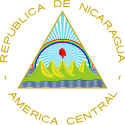 |
|---|
Parliamentary elections were held in Nicaragua on 2 November 1930 to elect half of the seats in the Chamber of Deputies and one-third of the seats in the Senate of the National Congress.
Contents
"The 1930 congressional elections, also supervised by U.S. Marines, produced a Liberal majority." [1]
"The seats of 1/3 of the Senators and of 1/2 of the Deputies were to be filled in the congressional elections of 1930. The two major parties, Liberal and Conservative, were the only contestants, as the Liberal Republican Party did not qualify under the terms of the electoral law. The elections, which were held on 2 November 1930, resulted in the election of 7 Liberal Senators and 16 Deputies and 2 Conservative Senators and 6 Deputies. The total vote cast was approximately 70 percent of that in the same districts in 1928." [2]